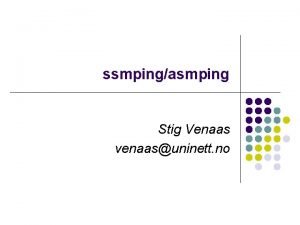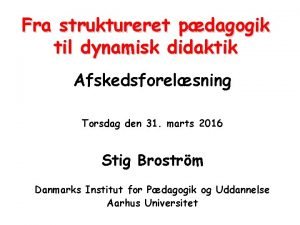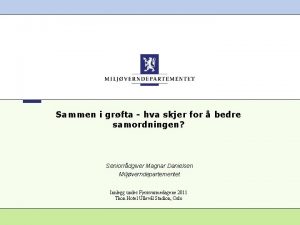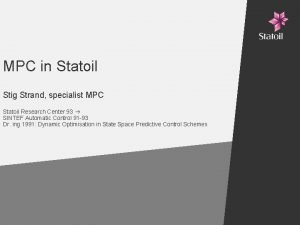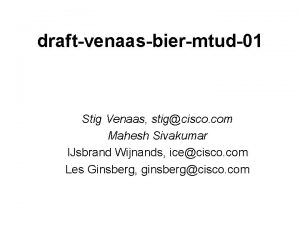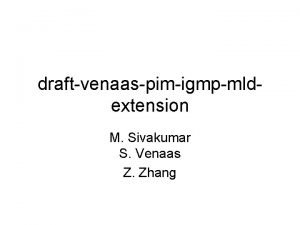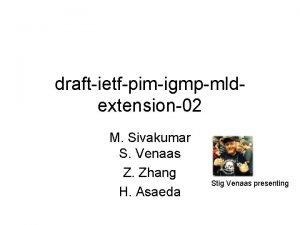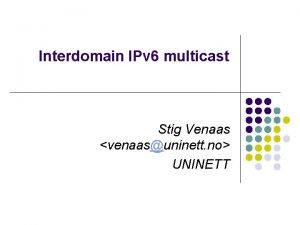draftietfpimigmpmldextension M Sivakumar S Venaas Z Zhang Stig







- Slides: 7

draft-ietf-pim-igmp-mldextension M. Sivakumar S. Venaas Z. Zhang Stig Venaas presenting

Overview – A generic way of extending IGMPv 3/MLDv 2 messages • Defines extension type and registry – BIER extension moved to IGMP/MLD overlay (draft-ietf-bier-mld) – Draft was just adopted • Hitoshi suggested using TLVs, see later slide

IGMP/MLD Additional Data – In RFC 3376 (IGMPv 3) 4. 1. 10. Additional Data If the Packet Length field in the IP header of a received Query indicates that there additional octets of data present, beyond the fields described here, IGMPv 3 implementations MUST include those octets in the computation to verify the received IGMP Checksum, but MUST otherwise ignore those additional octets. When sending a Query, an IGMPv 3 implementation MUST NOT include additional octets beyond the fields described here. – Similar language for reports, and for queries/reports in RFC 3810

Extension Type – We think it is good to have an extension type in case there may be multiple extensions for different purposes. – Implementations that support a specific type, process the type as defined. – Implementations that do not support an extension type, as well as current implementations, treat it as Additional Data in the RFC and do not process the type. – Extensions should not be common. Cannot expect router and host implementations in general to be updated.

Draft currently specifies a single extension type and value A query looks like this: 0 1 2 3 4 5 6 7 8 9 0 1 +-+-+-+-+-+-+-+-+-+-+-+-+-+-+-+-+ | Type = 0 x 11 | Max Resp Code | Checksum | +-+-+-+-+-+-+-+-+-+-+-+-+-+-+-+-+ | Group Address | +-+-+-+-+-+-+-+-+-+-+-+-+-+-+-+-+ | Resv |S| QRV | QQIC | Number of Sources (N) | +-+-+-+-+-+-+-+-+-+-+-+-+-+-+-+-+ | Source Address [1] | +-+ | Source Address [2] | +. -+. . . +-+ | Source Address [N] | +-+-+-+-+-+-+-+-+-+-+-+-+-+-+-+-+ |Extension Type | Extension Value | ~ ~ +-+-+-+-+-+-+-+-+-+-+-+-+-+-+-+-+

Extension TLV proposal As part of adoption call, Hitoshi suggested using a TLV format. Something like the below. 0 1 2 3 4 5 6 7 8 9 0 1 +-+-+-+-+-+-+-+-+-+-+-+-+-+-+-+-+ | Reserved | Total Extension Length | +-+-+-+-+-+-+-+-+-+-+-+-+-+-+-+-+ | Extension Type 1 | Extension Length 1 | +-+-+-+-+-+-+-+-+-+-+-+-+-+-+-+-+ | Extension Value 1 | +-+-+-+-+-+-+-+-+-+-+-+-+-+-+-+-+ +. -+. . . +-+ +-+-+-+-+-+-+-+-+-+-+-+-+-+-+-+-+ | Extension Type n | Extension Length n | +-+-+-+-+-+-+-+-+-+-+-+-+-+-+-+-+ | Extension Value n | +-+-+-+-+-+-+-+-+-+-+-+-+-+-+-+-+

Some questions – Do we need TLVs? Allows combination of different extensions. – Do we need total extension length? • It allows additional data after the TLVs – • Else we do not know when to stop processing TLVs We can verify that the total length matches with the length of the TLVs specified – – – If implementations send additional data not following this scheme, they are unlikely to have a value here that matches the total TLV length. Algorithm: Loop through TLVs, add up 4 (type and length overhead) + value length for each, until >= total length. If equal, validation passed. Else assume not TLV extension and ignore.
